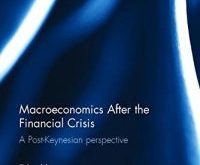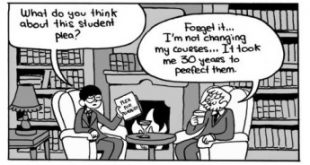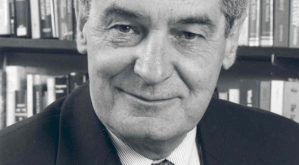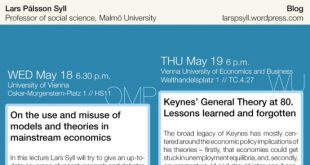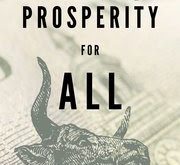[embedded content] If your German isn’t to rusty, this lecture by Hagen Krämer might give you some interesting reflections on the rather sad state of ‘modern’ macroeconomics.
Read More »Macroeconomics after the financial crisis
Macroeconomics after the financial crisis A new volume of Routledge Frontiers of Political Economy series is out, featuring accessible, informative and provocative contributions by leading Post-Keynesian scholars on the shortcomings of mainstream microfoundeds DSGE modeling and the need for new — relevant and realist — views on economic — both fiscal and monetary — policies. Oh, and yes, yours truly is one of the contributors — as are e. g. James Galbraith, Engelbert Stockhammer and Jesper...
Read More »Keynes’ deadheads — still alive
Keynes’ deadheads — still alive I am not confident, however, that on this occasion the cheap-money phase will be sufficient by itself to bring about an adequate recovery of new investment. It may still be the case that the lender, with his confidence shattered by his experiences, will continue to ask for new enterprise rates of interest which the borrower cannot expect to earn … If this proves to be so, there will be no means of escape from prolonged and perhaps interminable depression...
Read More »Krugman and ‘what Keynes really meant’
Krugman and ‘what Keynes really meant’ Paul Krugman has often been criticized by people like yours truly for getting things pretty wrong on the economics of John Maynard Keynes. When Krugman has responded to the critique, by himself rather gratuitously portrayed as about ‘what Keynes really meant,’ the overall conclusion is — ‘Krugman doesn’t care.’ Responding to a post up here on the blog, Krugman writes: Surely we don’t want to do economics via textual analysis of the masters. The...
Read More »So much for pluralism …
So much for pluralism … It comes as no surprise to me—but it probably does to everyone outside of economics—that a senior lecturer at the University of Glasgow, Alberto Paloni, an expert in post-Keynesian theory, has been stopped from teaching a core degree module on macroeconomics. This, after an essay in the Royal Economic Society newsletter specifically cited Paloni’s course as introducing a necessary pluralism into the teaching of economics … All Paloni did was teach students some Post...
Read More »Lucas’ FORTRAN caricature of economics
Lucas’ FORTRAN caricature of economics Lucas … internalized the caricature he extracted from Samuelson’s Foundations: that mathematical analysis is the only legitimate way of doing economic theory, and that, in particular, the essence of macroeconomics consists in a combination of axiomatic formalism and philosophical reductionism (microfoundationalism). For Lucas, the only scientifically legitimate macroeconomic models are those that can be deduced from the axiomatized...
Read More »Vienna
Back in the 80’s yours truly had the pleasure of studying German at University of Vienna. A wonderful town full of history and Kaffeehäuser. I’m really looking forward to visiting it again. In case you can’t be there, here’s an admittedly insufficient substitute, but still … [embedded content]
Read More »Life Among the Econ
Life Among the Econ A comparison of status relationships in the different “fields” shows a definite common pattern. The dominant feature, which makes status relations among the Econ of unique interest to the serious student, is the way that status is tied to the manufacture of certain types of implements called “modls.” The status of the adult male is determined by his skill at making the “modl” of his “field.” The facts (a) that the Econ are highly status-motivated, (b) that status is...
Read More »Frank Ackerman on general equilibrium theory
Frank Ackerman on general equilibrium theory General equilibrium is fundamental to economics on a more normative level as well. A story about Adam Smith, the invisible hand, and the merits of markets pervades introductory textbooks, classroom teaching, and contemporary political discourse. The intellectual foundation of this story rests on general equilibrium, not on the latest mathematical excursions. If the foundation of everyone’s favourite economics story is now known to be unsound —...
Read More »The biggest mistake in the history of macroeconomic thought
The biggest mistake in the history of macroeconomic thought The Keynesian economics of the General Theory is static. It purports to explain how employment, GDP and the interest rate are determined at one weekly meeting, taking the price level as fixed. Modern macroeconomics is dynamic. It purports to explain how employment, GDP, the interest rate and the price level are determined in a sequence of weekly meetings. To knit together the temporary one-week Keynesian equilibria, Samuelson, in...
Read More » Heterodox
Heterodox

